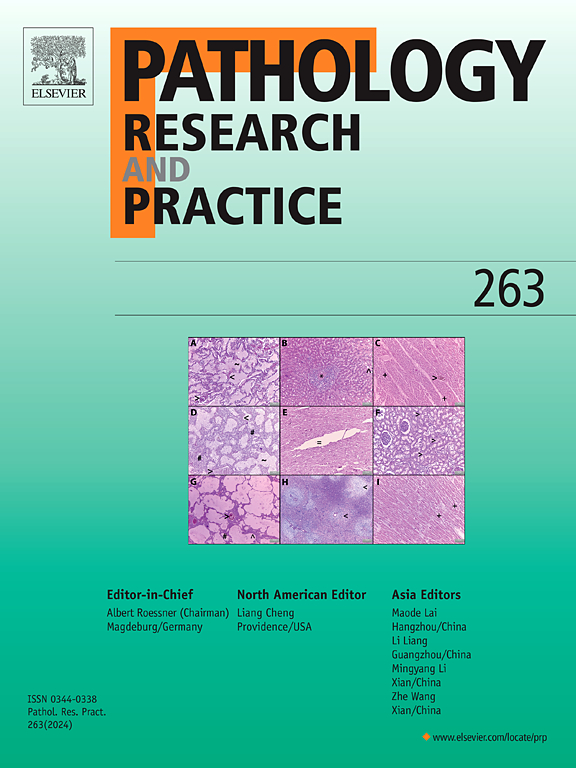Managing cancer in autoimmune patients: Overcoming therapeutic challenges and expanding treatment options
IF 3.2
4区 医学
Q2 PATHOLOGY
引用次数: 0
Abstract
The intricate interplay between cancer and autoimmune diseases (ADs) is rooted in immune dysregulation, where genetic susceptibility, chronic inflammation, epigenetic modifications, and immunosuppressive therapies contribute to tumorigenesis. The dualistic nature of immune activation complicates therapeutic strategies, as immune checkpoint inhibitors and other immune-stimulatory therapies may exacerbate underlying ADs, leading to immune-related adverse events (irAEs), including organ toxicity, dermatologic reactions, and disease flares. Conversely, immunosuppressive treatments aimed at controlling ADs can compromise anti-tumor immunity and reduce the efficacy of cancer therapies. This necessitates a precision-medicine approach that balances effective tumor control with mitigation of immune-mediated complications. This review explores current therapeutic challenges and opportunities in managing cancer patients with pre-existing autoimmune conditions. Emphasis is placed on alternative treatment modalities, including targeted therapies such as kinase inhibitors (e.g., sorafenib), and adoptive cellular therapies like CAR-T and CAR-NK cells, which exhibit selective tumor targeting with a potentially reduced risk of irAEs. Moreover, natural compounds with dual immunomodulatory and antitumor properties offer a promising therapeutic avenue due to their multi-targeting capabilities and favorable safety profiles. Through case-based analysis, we highlight strategies that simultaneously address tumor progression and autoimmune dysregulation, underscoring the need for integrated, individualized therapeutic regimens in this complex patient population.
自身免疫患者的癌症管理:克服治疗挑战和扩大治疗选择
癌症和自身免疫性疾病(ADs)之间复杂的相互作用根植于免疫失调,其中遗传易感性、慢性炎症、表观遗传修饰和免疫抑制治疗有助于肿瘤的发生。免疫激活的二重性使治疗策略复杂化,因为免疫检查点抑制剂和其他免疫刺激疗法可能加剧潜在的ad,导致免疫相关不良事件(irAEs),包括器官毒性、皮肤反应和疾病发作。相反,旨在控制ad的免疫抑制治疗可能会损害抗肿瘤免疫,降低癌症治疗的疗效。这就需要一种精确的医学方法来平衡有效的肿瘤控制和减轻免疫介导的并发症。这篇综述探讨了目前治疗癌症患者自身免疫性疾病的挑战和机遇。重点放在替代治疗方式上,包括靶向治疗,如激酶抑制剂(如索拉非尼)和过继细胞治疗,如CAR-T和CAR-NK细胞,它们表现出选择性肿瘤靶向,潜在地降低了irae的风险。此外,具有双重免疫调节和抗肿瘤特性的天然化合物由于其多靶点能力和良好的安全性提供了一个有前途的治疗途径。通过基于病例的分析,我们强调了同时解决肿瘤进展和自身免疫失调的策略,强调了在这种复杂的患者群体中需要综合的、个性化的治疗方案。
本文章由计算机程序翻译,如有差异,请以英文原文为准。
求助全文
约1分钟内获得全文
求助全文
来源期刊
CiteScore
5.00
自引率
3.60%
发文量
405
审稿时长
24 days
期刊介绍:
Pathology, Research and Practice provides accessible coverage of the most recent developments across the entire field of pathology: Reviews focus on recent progress in pathology, while Comments look at interesting current problems and at hypotheses for future developments in pathology. Original Papers present novel findings on all aspects of general, anatomic and molecular pathology. Rapid Communications inform readers on preliminary findings that may be relevant for further studies and need to be communicated quickly. Teaching Cases look at new aspects or special diagnostic problems of diseases and at case reports relevant for the pathologist''s practice.

 求助内容:
求助内容: 应助结果提醒方式:
应助结果提醒方式:


